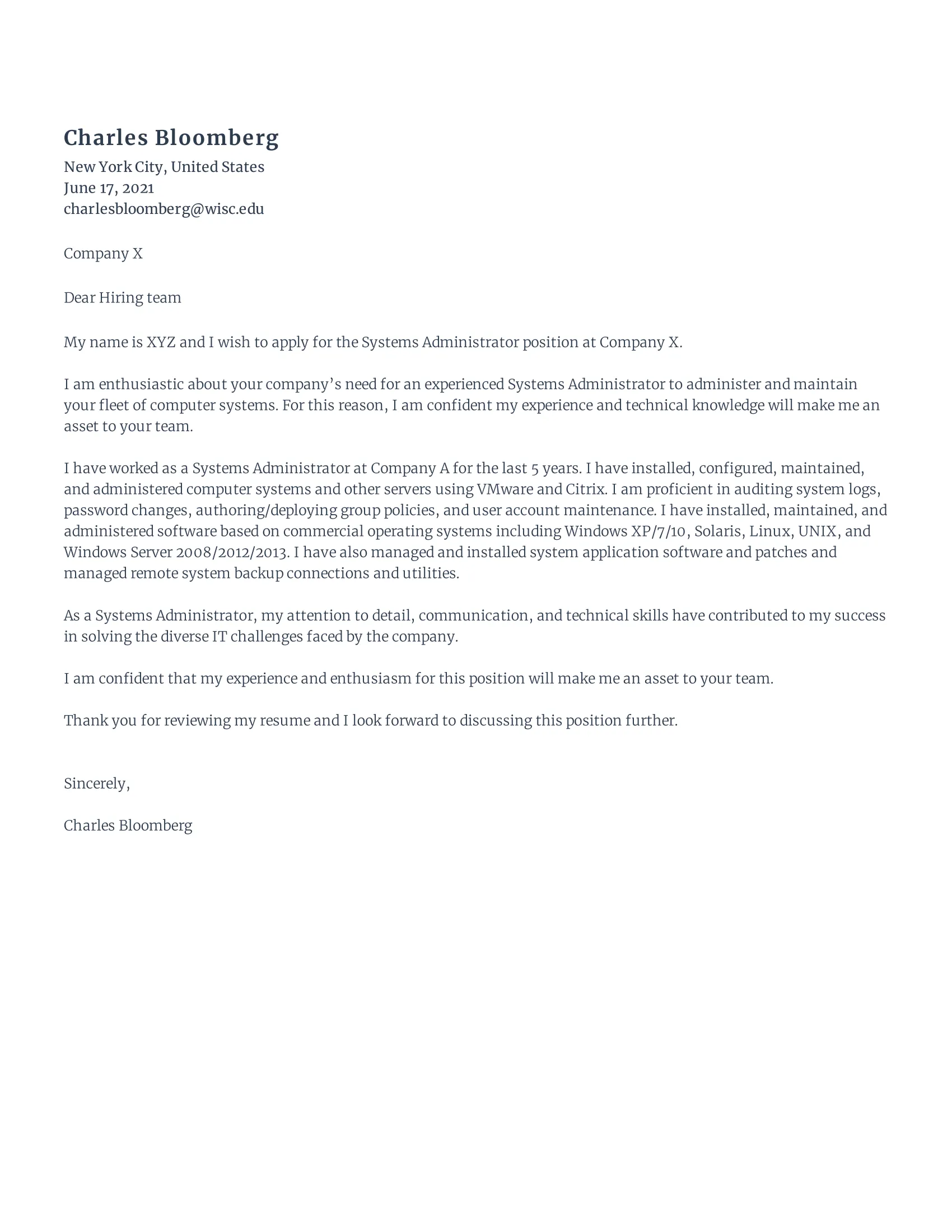A system admin cover letter is your first chance to impress a potential employer and secure an interview. It’s your opportunity to showcase your skills, experience, and enthusiasm for the role. Unlike a resume, which is a factual account of your career, your cover letter allows you to tell a story, highlighting how your unique abilities align with the specific job requirements. In this guide, we’ll delve into the secrets of crafting a compelling system admin cover letter that captures attention and gets you hired. By following these tips, you’ll be well on your way to landing your dream job. A well-crafted cover letter provides context to your resume, explaining why you are the ideal candidate for the position. It shows your personality and your understanding of the company’s needs. Remember, the goal is to stand out and demonstrate that you are not just qualified, but also a great fit for the team and the company culture. This will significantly increase your chances of moving forward in the hiring process.
Highlighting Your System Admin Skills
Your cover letter must clearly showcase your core system administration skills. This means going beyond simply listing your technical proficiencies; you need to demonstrate how you’ve applied these skills to achieve tangible results. Quantify your accomplishments whenever possible. For instance, instead of saying “Managed servers,” state “Managed a network of 50+ servers, resulting in a 15% improvement in system uptime.” Highlight your expertise in areas like server management, network configuration, security protocols, and troubleshooting. Mention any specialized certifications or training you have, as these add credibility to your application. Tailor your skills section to match the specific requirements of the job description, emphasizing the skills that the employer values most. Use keywords from the job posting to ensure your letter aligns with their needs. This targeted approach demonstrates that you’ve carefully considered the role and are genuinely interested in the opportunity.
Technical Proficiency in System Administration
Technical proficiency is the cornerstone of any successful system administrator’s career. Your cover letter should reflect your command of various technologies, including server hardware and software, virtualization platforms, cloud services, and scripting languages. When describing your technical abilities, be specific. Rather than simply stating “familiar with virtualization,” detail your experience with VMware, Hyper-V, or other relevant platforms. Mention any experience with cloud services like AWS, Azure, or Google Cloud, and highlight your understanding of cloud-based infrastructure management. If you have experience with scripting languages like Python or PowerShell, emphasize how you’ve used these to automate tasks, manage configurations, or improve system performance. The ability to automate tasks is highly valued, so provide examples of how your scripting skills have benefited previous employers. The goal is to showcase your technical versatility and your ability to leverage technology to solve complex problems.
Demonstrating Problem-Solving Abilities
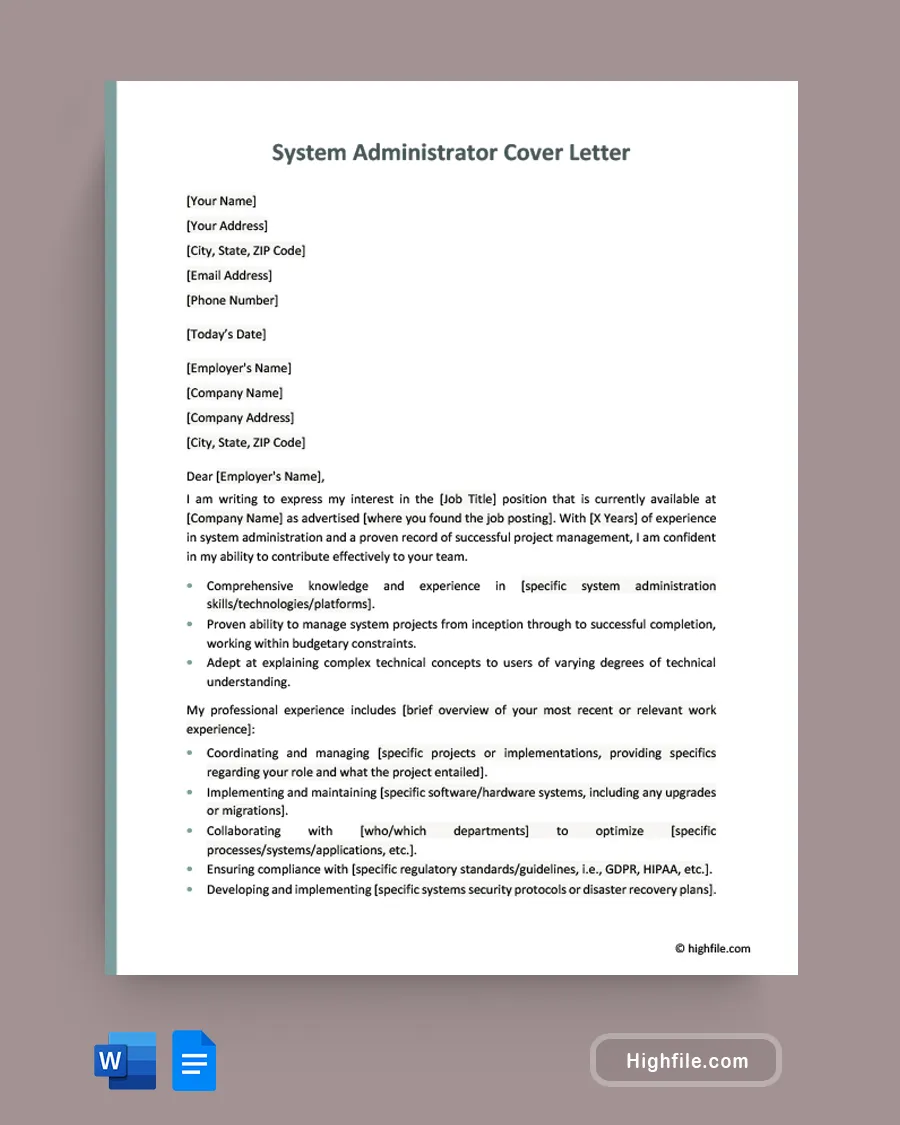
System administrators are often called upon to troubleshoot complex issues, so your cover letter must demonstrate your problem-solving abilities. Provide specific examples of how you’ve resolved technical challenges in previous roles. Describe the problem, the steps you took to identify the root cause, and the solutions you implemented. Highlight your analytical skills and your ability to approach problems systematically. If you’ve implemented new troubleshooting methodologies, describe the process and its impact on system stability. Detail how you’ve used your knowledge to mitigate risks, minimize downtime, and improve overall system performance. Show that you can think critically and effectively implement solutions under pressure. Your ability to remain calm and focused during crises demonstrates your ability to perform well under pressure. Emphasizing these problem-solving skills can significantly improve your appeal to potential employers.
Showcasing Experience with Operating Systems
System administrators work with a variety of operating systems, and your cover letter should clearly outline your experience with these. Specify your experience with Windows Server, Linux distributions (such as Ubuntu, CentOS, or Red Hat), and any other OS platforms relevant to the job. Highlight your expertise in system configuration, maintenance, and security for each OS. Be specific about your experience with specific features and tools. For Windows, mention your experience with Active Directory, Group Policy, and PowerShell scripting. For Linux, detail your familiarity with the command line, system administration tools, and security configurations. Make sure to mention any experience with containerization technologies like Docker or Kubernetes, as this is becoming increasingly important. Tailor the focus on the operating systems based on the job’s requirements to show relevance.
Windows Server Experience
If the job requires Windows Server expertise, be sure to highlight your experience. This includes Active Directory management, DNS and DHCP configuration, and experience with Windows Server roles and features. Describe any experience you have with virtualizing Windows Server environments using Hyper-V or other platforms. Explain your proficiency in managing and troubleshooting Windows Server systems, including performance monitoring, security auditing, and patch management. If you’ve worked with Windows Server in cloud environments like Azure, mention this experience as well. The more detail you provide about your Windows Server experience, the more attractive your cover letter will be to hiring managers looking for specific skills.
Linux Server Experience
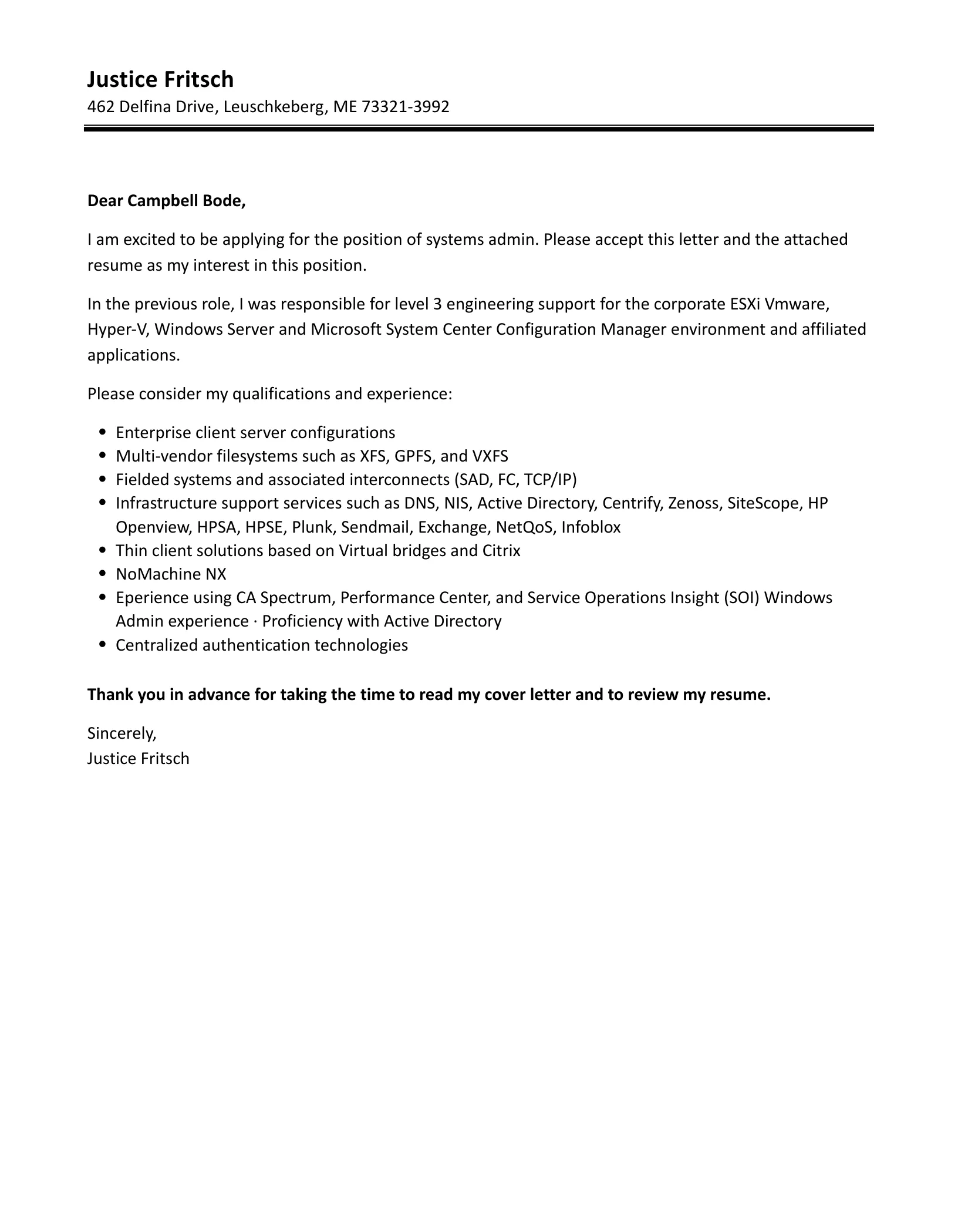
If the job involves Linux systems, your cover letter should emphasize your Linux skills. Detail your experience with different Linux distributions like Ubuntu, CentOS, or Red Hat. Mention your proficiency in command-line administration, shell scripting, and system configuration. Describe your experience with server security, including firewall configuration, user management, and access control. If you’ve worked with Linux-based web servers, databases, or other applications, mention this experience. Experience with automation tools like Ansible or Puppet is valuable. The more you can demonstrate your Linux server skills, the better. Highlight relevant certifications, such as Red Hat Certified System Administrator (RHCSA), to boost credibility.
Emphasizing Cybersecurity Knowledge
In today’s environment, cybersecurity is crucial, making it important to highlight your relevant skills. Mention your experience with security protocols, firewalls, intrusion detection systems, and security audits. Describe your knowledge of security best practices, such as data encryption, access controls, and vulnerability management. If you have experience with security information and event management (SIEM) tools, be sure to include this. Any certifications like CompTIA Security+, Certified Information Systems Security Professional (CISSP), or other relevant security certifications should be prominently displayed. Explain how you’ve helped protect systems from cyber threats. Demonstrating your commitment to security shows potential employers you understand the importance of maintaining a secure infrastructure.
Network Administration Skills
System administrators frequently manage network infrastructure. Highlight your network administration skills, including your experience with network devices like routers, switches, and firewalls. Describe your knowledge of network protocols, such as TCP/IP, DNS, and DHCP. Mention any experience you have with network monitoring tools and troubleshooting network issues. Explain how you’ve configured and maintained network security, including firewalls and intrusion prevention systems. Your certifications such as Cisco Certified Network Associate (CCNA) and CompTIA Network+ are important to highlight. Show your understanding of network topologies and your ability to design and implement network solutions that meet business needs. This will help you stand out as a candidate who can effectively manage and maintain the network.
Communication and Teamwork Abilities
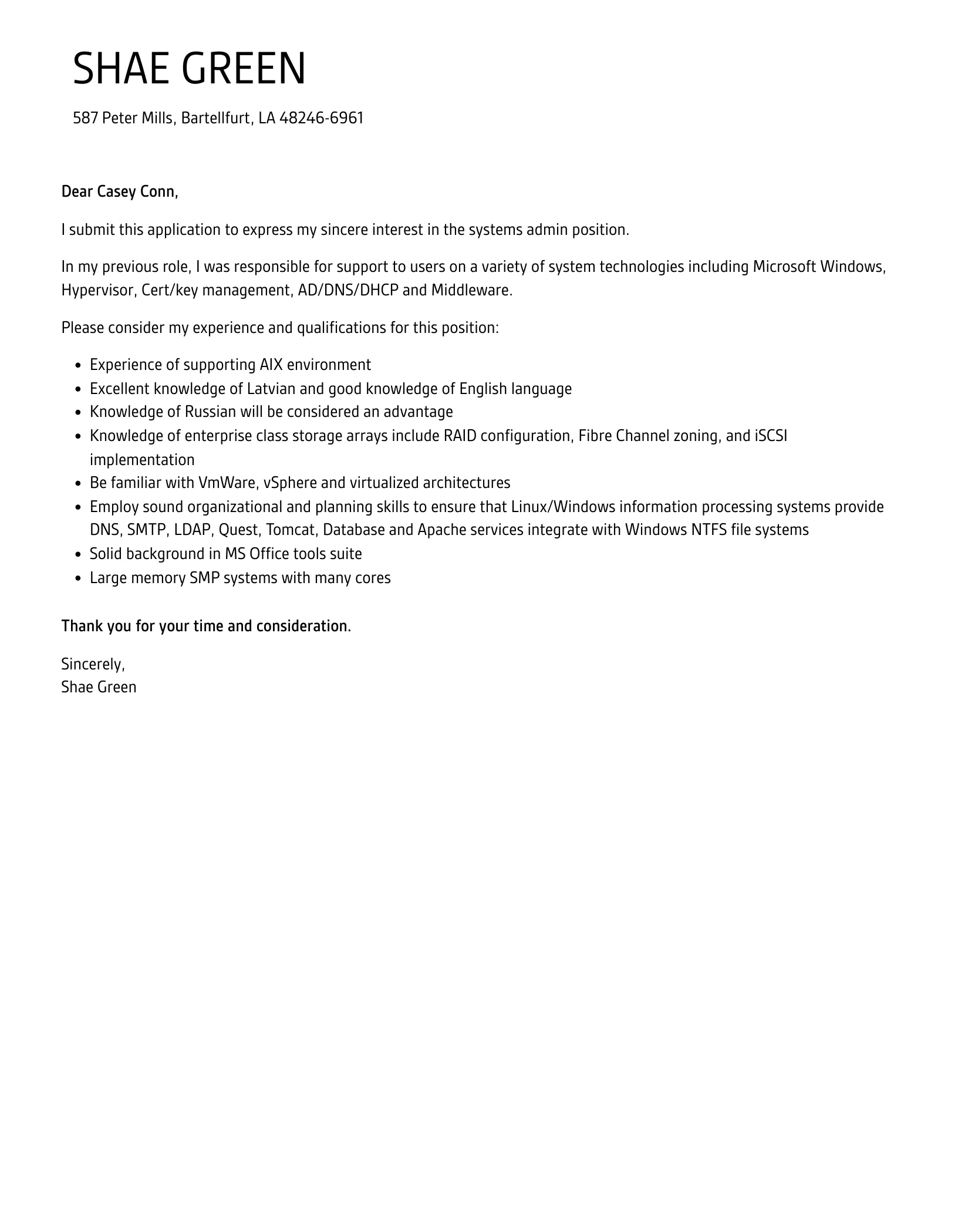
System administration often involves interacting with end-users, other IT staff, and management. Your cover letter should emphasize your communication and teamwork skills. Describe your ability to explain technical concepts in a clear and concise manner. Give examples of how you’ve worked effectively with teams to solve problems and implement solutions. Mention your ability to manage projects, prioritize tasks, and meet deadlines. If you have experience providing training or support to end-users, be sure to include it. Being able to communicate effectively and work collaboratively is critical. Illustrate how you’ve successfully collaborated with other teams. Show you are a team player.
Tailoring Your Cover Letter for the Role
The most effective cover letters are tailored to the specific job you are applying for. Generic cover letters, while easy to create, often fail to make a strong impression. Start by carefully reviewing the job description and identifying the key requirements and qualifications. Then, adapt your cover letter to address those specific needs. Highlight the skills and experiences that align most closely with the job requirements. Use keywords from the job description throughout your letter. Show your knowledge of the company, the role, and the industry. Demonstrate a genuine interest in the position and the company. This level of personalization shows that you’ve put in the effort and are serious about the opportunity.
Researching the Company and Job Requirements
Before writing your cover letter, thoroughly research the company and the specific job role. Visit the company’s website to learn about their mission, values, and recent projects. Look for information about the IT infrastructure and technologies they use. If possible, find out more about the hiring manager or team you’ll be working with. Understand the job’s requirements and expectations by carefully reading the job description. Identify the key skills, experience, and qualifications the employer is seeking. Use this information to tailor your cover letter, highlighting your relevant skills and experiences, and showcasing your understanding of the company and the role. Address specific needs mentioned in the job description. This demonstrates your attention to detail and your genuine interest in the opportunity.
Matching Skills and Qualifications
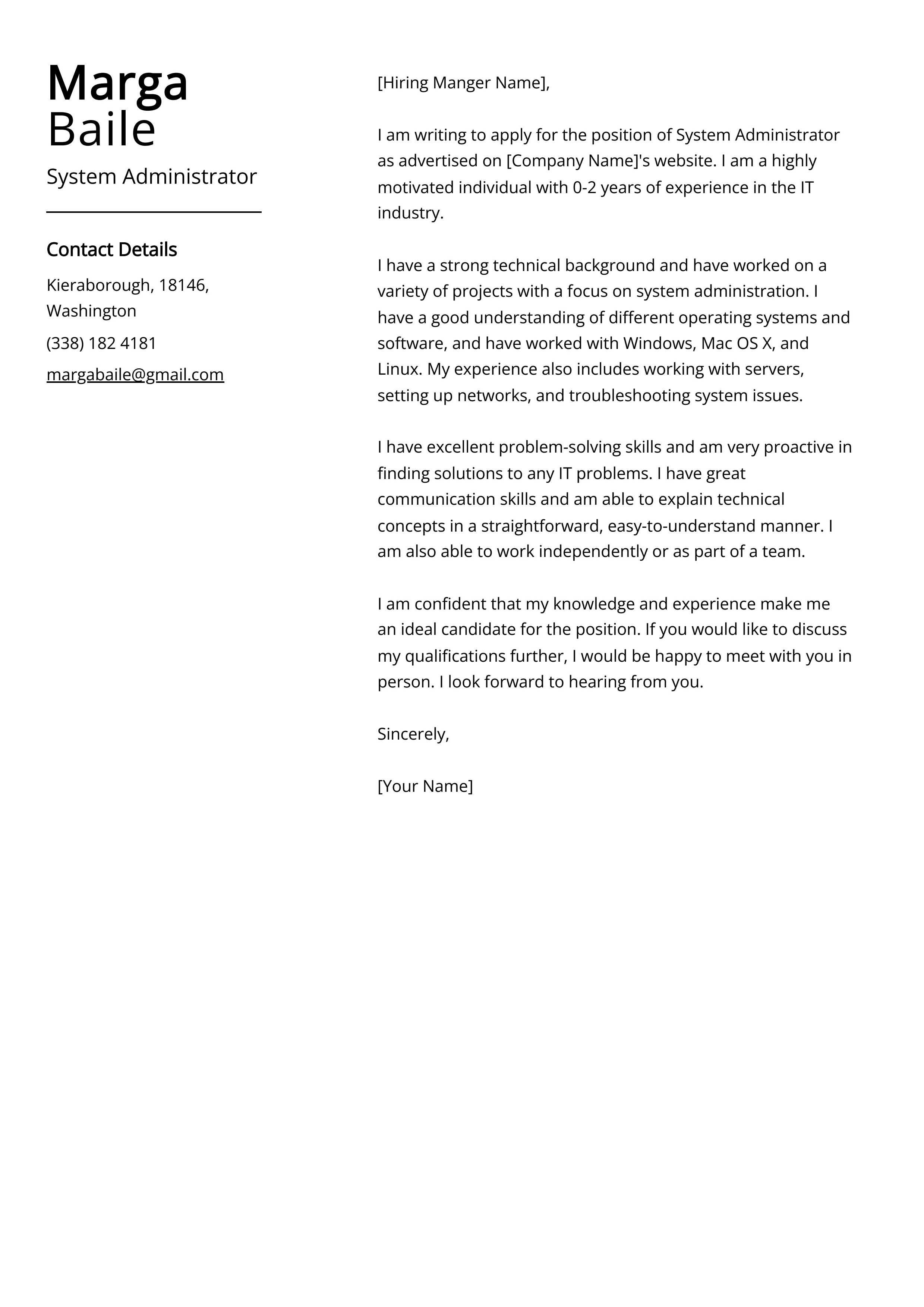
Once you’ve researched the company and job requirements, match your skills and qualifications to those needs. Identify the key skills and experiences that align with the job description. Then, in your cover letter, provide specific examples of how you’ve demonstrated those skills. Use action verbs to describe your accomplishments and contributions. Quantify your achievements whenever possible. For example, instead of saying “Improved system performance,” say “Improved system performance by 20% by implementing a new caching strategy.” Show, don’t just tell. Back up your claims with concrete evidence, demonstrating to the employer that you possess the abilities they seek. Highlight certifications and any specialized training that demonstrates you have the relevant skills.
Formatting and Structure for System Admin Cover Letter
A well-formatted and structured cover letter is crucial for making a positive impression. Use a professional font like Times New Roman, Arial, or Calibri. Maintain a clean and easy-to-read layout with consistent formatting. Start with your contact information, followed by the date and the hiring manager’s name and title (if known). Address the letter to the hiring manager or the appropriate contact person. The body of your letter should be concise, typically consisting of three to four paragraphs. The first paragraph should introduce yourself and state the position you are applying for. The subsequent paragraphs should highlight your relevant skills, experience, and accomplishments. The final paragraph should express your interest in the position and your desire to learn more. Finish with a professional closing, such as “Sincerely” or “Best regards,” and your typed name. Proofread your letter carefully to eliminate any errors.
Using Action Verbs
Action verbs are essential for making your cover letter compelling. Use strong verbs to describe your accomplishments and contributions. Instead of using passive language, use active voice to show what you’ve done. For instance, use “Implemented” instead of “Was responsible for implementing,” or “Managed” instead of “Was involved in managing.” Here are some examples: “Developed,” “Implemented,” “Managed,” “Resolved,” “Optimized,” “Administered,” “Configured,” “Troubleshooted,” “Automated,” and “Secured.” Using action verbs makes your letter more dynamic and engaging. This shows that you are proactive and results-oriented. This will make your letter more impactful. By using strong action verbs, you capture the reader’s attention and effectively convey your value.
Maintaining a Professional Tone
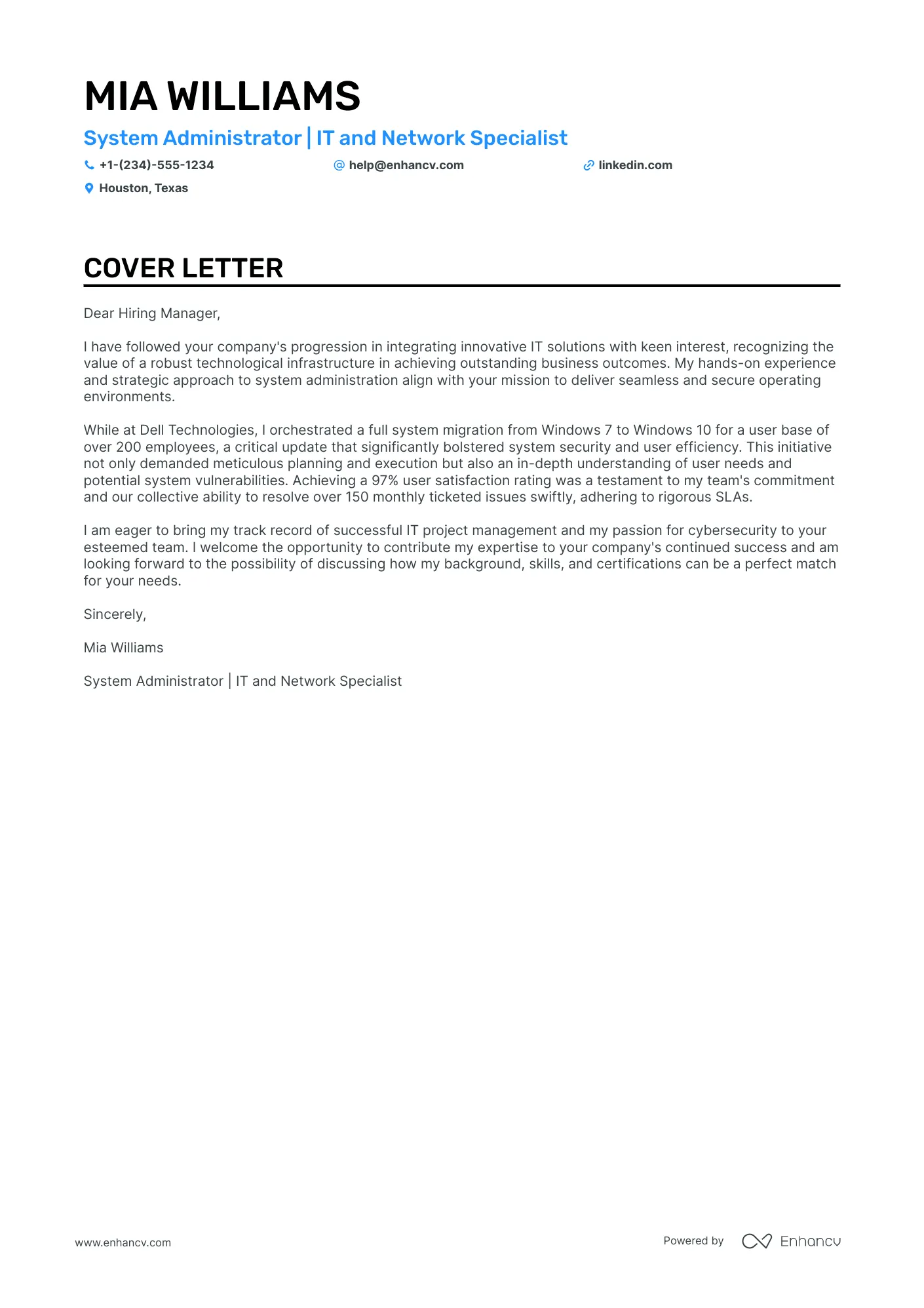
Maintaining a professional tone is critical. Your cover letter is a formal business document, so use a professional and respectful tone throughout. Avoid using slang, jargon, or overly casual language. Keep your language clear and concise. Proofread your letter carefully for grammatical errors and typos, as these can undermine your credibility. Use a formal salutation, like “Dear Mr./Ms. [Last Name],” and a professional closing, such as “Sincerely” or “Best regards.” Make sure to sound confident but not arrogant. Show your enthusiasm for the opportunity and your respect for the company. A professional tone demonstrates that you take the job seriously and that you understand workplace communication standards.
Proofreading and Editing Your Letter
Proofreading and editing your cover letter is one of the most important steps in the writing process. Errors can damage your chances of getting an interview. Before submitting your cover letter, carefully proofread it for any grammatical errors, spelling mistakes, and typos. Read the letter aloud to ensure that the sentences flow smoothly and that the language is clear and concise. Ask a friend, family member, or career advisor to review your letter and provide feedback. Consider using grammar-checking tools like Grammarly or ProWritingAid to catch any errors you might have missed. Ensure that your cover letter is well-written, polished, and free of errors. This attention to detail will show potential employers that you’re professional and take pride in your work.
Key Takeaways to Get Hired
Crafting a winning system admin cover letter takes time and effort, but the results are well worth it. Start by showcasing your core skills. Demonstrate your technical proficiency, emphasizing experience with operating systems, security, and networking. Then, tailor your letter to the specific job. Research the company and the role. Emphasize the skills and experiences that align with the job requirements. Use strong action verbs and maintain a professional tone. Proofread and edit your letter carefully to eliminate any errors. Highlight your problem-solving skills, and demonstrate your ability to communicate and work effectively. By following these secrets, you’ll significantly improve your chances of landing your dream job. A great cover letter is the first step toward a new career.
